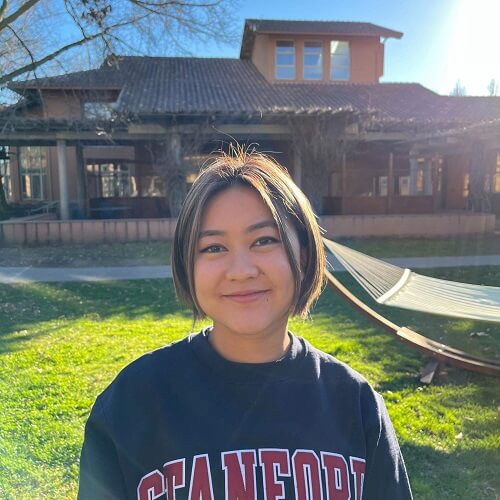Fall 2024 Immigrant Student Scholarship Winner
Arisa Chue
Arisa Chue is a high-achieving student attending Stanford University. Growing up as a Japanese-American, Arisa has learned that finding your cultural identity does not happen overnight; it takes time. Caring for her family while balancing her academic aspirations has not been easy, but she has persevered and emerged as a stronger person. We congratulate Arisa on all she has achieved.

Read Arisa’s Essay:
Both of my parents are immigrants and came from Japan to obtain a better life for their children. Although my mother has lived in the US for nearly 30 years, she still struggles with English. I help make doctor appointments or craft emails for my mother. Growing up listening to my mother stumble through her words, I’ve learned the difficulty and challenges of a language barrier. Growing up as a Japanese-American, I spent Saturdays at a Japanese school where a whole week’s curriculum instruction is delivered in one day with homework the rest of the week. I finally obtained my Japanese high school diploma and looking back, amidst the tears and hugs at the graduation ceremony, I loved all those years and more. It strengthened my cultural identity and I found lifelong friends who share my strange way of speaking half my sentences in Japanese and the other half in English, knowing exactly where to break into which language. Finding one’s cultural identity, reinforced by language, is a lifelong journey, which helps me connect with my family: my mother, who has spoken only Japanese to me since I was born, and my grandmother, Aki, who lived in Japan and had a profound impact on what I want to be when I graduate college. For as long as I can remember, every holiday break, I open the wooden windows of Aki’s house to the sound of cicadas or snowfall. Living in her house in the summers and winters taught me the meaning of tradition. Opening the wooden windows every morning was important for the wooden house structure to breathe. Setting a warm bowl of rice and water for my grandpa’s altar showed respect to our ancestors. For the first two years of high school, however, I spent all my holidays in just one place: a long-term rehabilitation home. My Aki had suffered a stroke and I spent entire days taking care of her. The days were spent as a mirror of roles reversed. When I was young, Aki delighted in Arisa Chue teaching me all the things I know now. Aki’s stroke left her half-paralyzed on one side, which made speech difficult. Now I was teaching her how to speak again. Her difficulty with speech and recovery inspires my current academic interest. Human communication comprises gestures, postures, and facial expressions that all complement one another to deliver a message. After taking an active part in Aki’s speech therapy sessions, I began to pay attention to the importance of language. That’s how I got attracted to natural language processing (NLP): connecting humans, machines, and languages through computational methods. This perfectly combined my academic pursuit of computer science (CS) and my newfound interest in linguistics. Studying new algorithms has opened my eyes to NLP’s boundary-breaking power. I’m excited that my code can bring us closer to machines that think, reason, and communicate. I want to contribute to the next evolutionary step of language, where we maximize the potential of communication using machines






